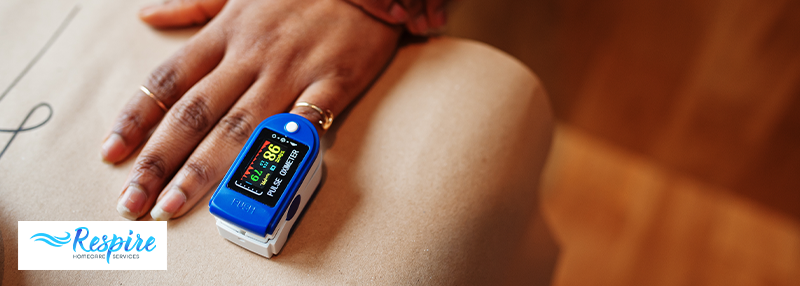Respire Home Care Services
Updated Thu January 30, 2025
Published Under: Lung Health Respiratory

Oxygen plays a crucial role in keeping our bodies functioning optimally. When oxygen levels drop, it can lead to a variety of symptoms and health issues. Today, we’ll explore the common signs of low oxygen levels, also known as hypoxia, and what you can do to address them.
What Causes Low Oxygen Levels?
Before we dive into the symptoms, it's essential to understand what can cause low oxygen levels in the first place. Some common causes include:
- Chronic respiratory diseases: Conditions like chronic obstructive pulmonary disease (COPD), emphysema, and chronic bronchitis can reduce lung function and oxygen intake.
- Heart conditions: Heart failure, cardiomyopathy, and other heart conditions can reduce blood flow and oxygen delivery to the body's tissues.
- High altitude: Traveling to high altitudes can lead to lower oxygen levels in the air, which can cause hypoxia.
- Sleep apnea: This sleep disorder can cause repeated episodes of low oxygen levels during sleep.
- Anemia: A lack of red blood cells or hemoglobin can reduce oxygen delivery to the body's tissues.
Low Oxygen Symptoms: What to Look Out For
So, what are the signs that you may not be getting enough oxygen? Here are some common symptoms to watch out for:
- Shortness of Breath (Dyspnea): Feeling like you can't catch your breath, even when sitting still or engaging in light physical activity.
- Fatigue and Weakness: Feeling unusually tired, weak, or lacking energy, even after resting.
- Confusion and Dizziness: Experiencing dizziness, lightheadedness, or confusion, which can be a sign of oxygen deprivation to the brain.
- Headaches: Frequent or severe headaches, which can be caused by oxygen deficiency in the brain.
- Pale or Blue-tinged Skin: Skin that appears pale, blue, or grayish, which can indicate low oxygen levels in the blood.
- Rapid Heart Rate: A heart rate that is higher than normal, which can be a sign of the body trying to compensate for low oxygen levels.
- Chest Pain or Tightness: Experiencing chest pain or tightness, which can be a sign of low oxygen levels in the heart muscle.
What to Do If You're Experiencing Low Oxygen Symptoms
If you're experiencing any of these symptoms, it's essential to consult with your healthcare provider to rule out any underlying conditions. In the meantime, here are some steps you can take:
- Seek medical attention: If you're experiencing severe symptoms, such as chest pain or difficulty breathing, call emergency services or visit the emergency room.
- Use oxygen therapy: If prescribed by your doctor, oxygen therapy can help increase oxygen levels in the blood.
- Make lifestyle changes: Quit smoking, exercise regularly, and maintain a healthy diet to improve overall lung function and oxygen intake.
Breathe Easy with Respire Home Care
At Respire Home Care, we understand the importance of maintaining healthy oxygen levels. That's why we offer a range of respiratory services and products to help you breathe easier:
- Nebulizer Therapy: Nebulizer therapy delivers medication directly to the lungs through a nebulizer, which converts medication into a fine mist that can be easily inhaled. We offer a variety of nebulizers to meet the needs of our patients.
- Oxygen Therapy: On a case-by-case basis, we can provide a range of oxygen therapy options, including stationary and portable oxygen concentrators, compressed gas systems, and liquid oxygen systems. Our respiratory therapists work with patients to determine the best oxygen therapy option for their condition. Contact our team to see if you qualify for these services.
- Sleep Apnea Therapy: We provide sleep apnea therapy equipment, including CPAP and BiPAP machines, as well as supplies such as masks and tubing. Our respiratory therapists work closely with patients to ensure that they are comfortable with their equipment and that it is working properly. These services are offered on a case-by-case basis. Contact our team to see if you qualify for these services.
Durable Medical Equipment (DME) and Medical Supplies
We offer a wide range of durable medical equipment and supplies to meet the respiratory care needs of patients with acute or chronic respiratory diseases. Services associated with this include:
- Equipment Setup: Our experts will set up the necessary equipment in your home, ensuring it functions optimally.
- Training: We provide thorough training to patients and their caregivers on how to use and maintain the equipment.
- Custom Care Plans: Each patient receives a personalized care plan tailored to their specific needs.
If you’re in need of clinical respiratory services, durable medical equipment, enteral nutrition, and more, contact Respire Home Care today!
Contact Us TodayNote: If you are experiencing an emergency or see signs of an emergency, please call 911 immediately.
Comments